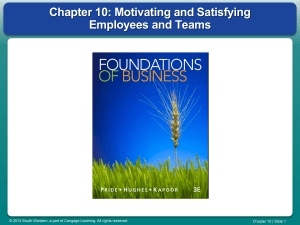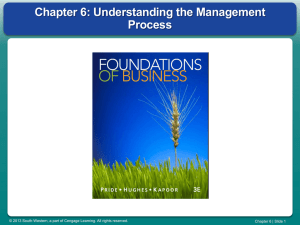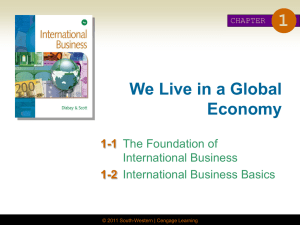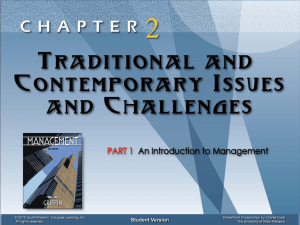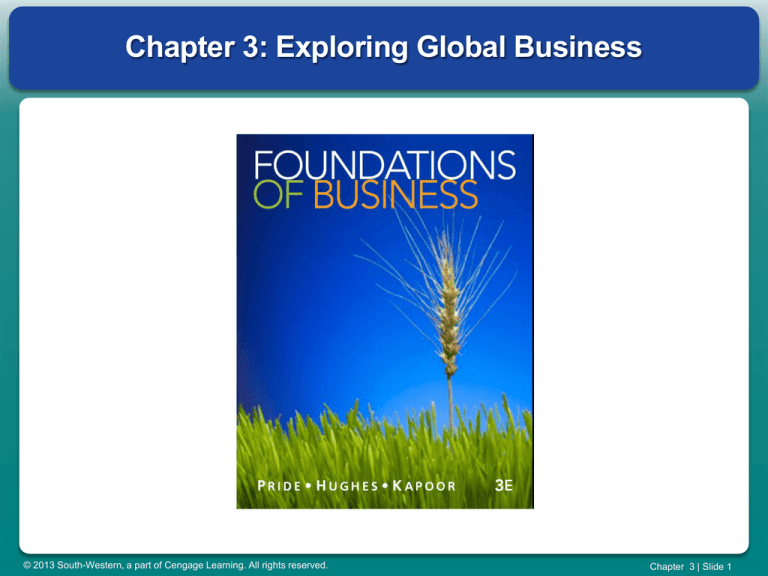
Chapter 3: Exploring Global Business
© 2013 South-Western, a part of Cengage Learning. All rights reserved.
Chapter 3 | Slide 1
Learning Objectives
1. Explain the economic basis for international
business.
2. Discuss the restrictions nations place on
international trade, the objectives of these
restrictions, and their results.
3. Outline the extent of international trade and identify
the organizations working to foster it.
4. Define the methods by which a firm can organize for
and enter into international markets.
5. Describe the various sources of export assistance.
6. Identify the institutions that help firms and nations
finance international business.
© 2013 South-Western, a part of Cengage Learning. All rights reserved.
Chapter 3 | Slide 2
The Basis for International Business
Absolute and Comparative Advantage
Exporting and Importing
© 2013 South-Western, a part of Cengage Learning. All rights reserved.
Chapter 3 | Slide 3
Restrictions to International Business
Types of Trade Restrictions
1. Tariffs
2. Nontariff Barriers
Reasons for Trade Restrictions
Reasons Against Trade Restrictions
© 2013 South-Western, a part of Cengage Learning. All rights reserved.
Chapter 3 | Slide 4
The Extent of International Business
The World Economic Outlook for Trade
1. Canada and Western Europe
2. Mexico and Latin America
3. Japan
4. Other Asian Countries
5. Emerging Europe
6. Commonwealth of Independent States
7. Exports and the U.S. Economy
© 2013 South-Western, a part of Cengage Learning. All rights reserved.
Chapter 3 | Slide 5
International Trade Agreements
The General Agreement on Tariffs and Trade
and the World Trade Organization
1. The Kennedy Round (1964–1967)
2. The Tokyo Round (1973–1979)
3. The Uruguay Round (1986–1993)
4. The Doha Round (2001)
World Trade and Global Economic Crisis
International Economic Organizations Working
to Foster Trade
© 2013 South-Western, a part of Cengage Learning. All rights reserved.
Chapter 3 | Slide 6
Methods of Entering International Business
Licensing
Exporting
Joint Ventures
Totally Owned Facilities
Strategic Alliances
Trading Companies
Countertrade
Multinational Firms
© 2013 South-Western, a part of Cengage Learning. All rights reserved.
Chapter 3 | Slide 7
Sources of Export Assistance
National Export Strategy (NES)
• Trade Promotion Coordinating Committee
(TPCC)
© 2013 South-Western, a part of Cengage Learning. All rights reserved.
Chapter 3 | Slide 8
Financing International Business
The Export-Import Bank of the United States
Multilateral Development Banks
The International Monetary Fund
© 2013 South-Western, a part of Cengage Learning. All rights reserved.
Chapter 3 | Slide 9

